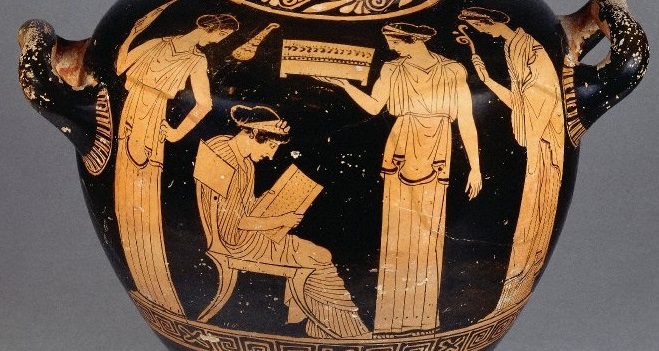
February 9, 2015, by Oliver Thomas
Classical Consolations
Undergraduate Juliet O’Brien finds solace in the classical sections of Hallward Library.
Even in an age where we have all sort of comforts at our disposal, we are nowhere near achieving universal happiness. I know I’m not the only one who gets anxious in the face of coursework deadlines and exams. And for those of us in history-related degrees, having science students constantly mocking your course as irrelevant does eventually make you unsure of the point of putting so much effort in.
I was in this sort of mood recently when I came across the following bit in Testament of Youth, Vera Brittain’s memoirs of living through the First World War and its aftermath. She and her fiancé Roland Leighton won places at Oxford before the war, in his case to study the Classics, but they postponed them in order to do war-work. Roland writes that the trenches have plunged him into such despair that he says “I wonder… if I can ever waste my time on Demosthenes again.” Her retort displays little sympathy and plentiful indignation: “I cannot yet feel as near to Light and Truth as I did when I was ‘wasting’ time on Plato and Homer.” I was forced to stop reading from sheer admiration of her spirit, and to reflect that she was absolutely right: ancient authors were just as perceptive as us, and have a timeless ability to provide consoling explanations for our problems.
Of course I have never lived through an event as tumultuous as the First World War and I hope I never have to suffer as Vera Brittain did. But classical literature does also prove a source of solace to me. Just before exams I remembered a mention of Xenophon’s Anabasis during the Studying the Greek World module, and borrowed it from the library out of curiosity. It certainly put my exam nerves in perspective to compare Xenophon’s worries about how to get 10,000 mutinous men back to Greece across hostile territory.
But Xenophon’s strong self-presentation is not typical of all heroes in ancient literature. On the contrary, plenty of realistically vulnerable protagonists remind us that our troubles are not unique to us. After following up a reference to Apollonius’ Argonautica, I couldn’t put the book down. One thing which struck a chord about Jason was his homesickness, but it comforted me to see that this feeling isn’t just for ‘wimps’. Vergil’s Aeneid, which I first encountered at A Level and never fail to find moving, also emphasises through its hero that one can pull through hardships and mishaps.
Classical literature and its authors often seem very far away, and our many of our values have certainly changed. Nevertheless, I hope I’ve shown that in fact these vivid texts can still comfort us across the centuries.
Image credit: Attic red-figure hydria, c.450 BCE. British Museum E190, © Trustees of the British Museum.
No comments yet, fill out a comment to be the first

Leave a Reply